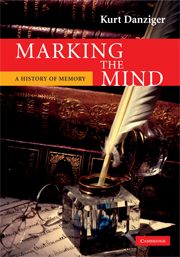4 - Privileged knowledge
Published online by Cambridge University Press: 05 June 2012
Summary
If one compares a sixteenth-century and a twentieth-century work on memory one soon realizes that they are not really concerned with the same topic. An eighteenth-century text would seem less strange to a twentieth-century reader, yet the differences would still be immense. What accounts for these impressions? Let us leave aside the differences that would exist between any texts separated by centuries and focus on differences peculiar to the way the topic of memory is handled. Certainly, the older writings contain unfamiliar terms and concepts relating to memory, but even when each of these has been explained there remains a pervasive strangeness that signals another age. This strangeness, I would suggest, has much to do with the profound changes that occurred in the meaning of knowledge about memory.
One thread can be detected in an otherwise very diverse literature between the end of the Middle Ages and the beginning of the modern period. It is formed by an implicit conviction that there is a special kind of knowledge to be obtained about memory if one adopts the right approach. Conceptions of what constitutes the right approach change completely during this period, but the idea that there certainly is such an approach remains. With the exception of the Platonists, to whom I will return presently, earlier memory discourse had had a somewhat pragmatic flavour. It addressed memory largely in terms of its usefulness in various contexts, rhetorical, dialectical or religious.
- Type
- Chapter
- Information
- Marking the MindA History of Memory, pp. 91 - 123Publisher: Cambridge University PressPrint publication year: 2008

